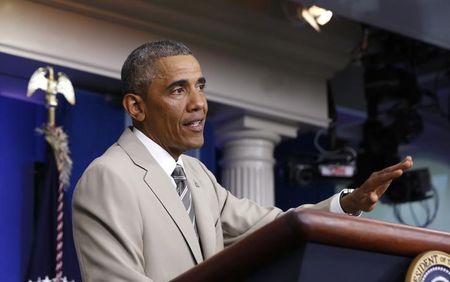By Patricia Zengerle
WASHINGTON (Reuters) - U.S. President Barack Obama has pledged to consult Congress about any expanded military action against Islamic State militants operating in Iraq and Syria, but support from the divided legislature is unlikely to come quickly - if at all.
Republicans are generally reluctant to vote for Obama's policy initiatives. And many of the president's fellow Democrats are deeply wary of any more foreign military involvement after over a decade of war in Iraq and Afghanistan.
If Congress were to be asked to approve extended military action or funding, it would probably be at a politically sensitive time just weeks before the Nov. 4 congressional elections in which Republicans hope to gain seats.
If the administration decides it needs additional money for expanded operations against the Islamic State, it will need to secure quick action in Congress or wait until after the elections.
It will be easier for Obama to win support from other countries as well as the American public if he presents a united front with Congress.
Michael O'Hanlon of the Brookings Institution think tank said congressional backing would also help Obama "cover his political flank" by "not doing something that only he and fellow Democrats... will be accountable for should it go south."
U.S. Senator Bob Corker of Tennessee, the top Republican on the Senate Foreign Relations Committee, said his panel had asked administration officials to testify in September about their plans for combating Islamic State.
"If there's a military operation, we're still unclear what's going to happen in terms of congressional involvement," a Democratic congressional aide said. "Election-year politics is going to play a big role."
A Reuters-IPSOS poll on Monday showed only 12 percent of Americans favor funding and supporting a multinational intervention in Iraq.
LEGAL QUESTIONS
Two Senate Democrats - Tim Kaine of Virginia and Chris Murphy of Connecticut - have argued that under the U.S. Constitution Obama must get Congress' authorization for expanded military action in either Iraq or Syria.
And House Democrats James McGovern of Massachusetts and Barbara Lee of California and Republican Walter Jones of North Carolina wrote to Speaker John Boehner this week and asked for a debate and a vote on the anti-Islamic State action.
Obama would be unlikely to face legal penalties if he goes ahead on his own but would face growing political pressure if the conflict escalates, said Stephen Vladeck, a professor of law at American University.
"If in fact we become more and more involved in military operations against ISIS, the political pressure is going to ratchet up on both Congress and the White House to reach some kind of agreement," Vladeck said, using the acronym for Islamic State in Iraq and Syria.
Congress could avoid a tough vote on whether to authorize military action by acting only on the question of funding.

The Pentagon said its current Iraq operations cost $7.5 million per day - more than half a billion dollars so far - but those costs would jump with a big escalation.
(Editing by David Storey and Jonathan Oatis)
